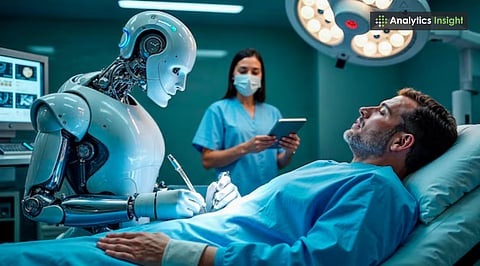Best AI Tools for Doctors in 2025: Which Ones Do Medics Prefer?
Overview
AI saves doctors time by scanning images, writing notes, and offering instant research answers
Tools like Aidoc and Heidi Health reduce burnout while improving patient safety and speed
Predictive AI platforms help hospitals spot risks early and plan care at the population level
Artificial intelligence is quickly becoming an important part of the healthcare industry. Doctors across the world are now relying on advanced technologies to automate tasks such as scanning X-rays, conducting medical research, and performing predictive healthcare analytics. These tools not only reduce human workload but also offer better control during complex surgeries and are highly regarded for early detection of diseases.
Top AI tools for the Healthcare Sector
Medics and healthcare professionals are utilizing advanced tools to help achieve higher precision in testing and gain better results that can be life-saving at times. Here is a list of the top medical AI tools:
OpenEvidence - The Medical Google
Medical professionals often need fast, reliable answers while treating patients. OpenEvidence works like a medical search engine, but instead of random websites, it pulls information from over 35 million peer-reviewed studies. It is already used by 40% of the US doctors on an everyday basis, handling around 8.5 million searches each month.
Why doctors like it: It saves time and gives trustworthy, referenced answers quickly. Instead of flipping through research papers, doctors can get clear guidance in seconds.
Aidoc - Machine That Reads Scans
Medical imaging takes hours to review, especially in emergencies. Aidoc, now accessible in more than 900 hospitals, uses technology to scan CTs and MRIs in real time. Its system has FDA and CE approvals for spotting strokes, lung clots, and brain bleeds.
Why doctors like it: Urgent cases are flagged immediately. A brain bleed that might have taken hours to review is caught in minutes, helping medics act faster.
Also Read: AI in Drug Approvals: How it is Reshaping Medicine and Efficiency
Heidi Health - The AI Scribe
Doctors spend a large chunk of their day typing notes, increasing the chances of instead of speaking to patients. Heidi Health, an AI assistant launched in Australia, now supports over 2 million patient visits each week. It listens during appointments and creates accurate medical notes that fit into electronic health records.
Why doctors like it: It cuts down paperwork and reduces burnout. Instead of late-night typing, they get to spend more time with patients.
Merative - Big Data for Medicine
Merative, which grew out of IBM’s Watson Health project, focuses on deep analytics. It looks at huge amounts of patient data and helps medics spot patterns, design treatments, and even support cancer care decisions.
Why doctors like it: Large hospital systems use it to track risks, improve care, and guide complex treatments, especially in oncology.
Also Read: Best Telemedicine Apps of 2025 for Virtual Healthcare
Murphi.ai and Microsoft Nuance DAX
While some tools have just entered the market, they are quickly gaining attention due to their practical use. Murphi.ai reduces after-hours paperwork by recording patient visits and creating ready-to-check notes. Nuance DAX, built into Microsoft’s AI ecosystem, does something similar by capturing conversations and turning them into medical records.
Why doctors like them: They free up face-to-face time with patients instead of forcing doctors to type into screens.
Predictive Platforms: Innovaccer, SAS Viya, Health Catalyst
For hospitals and healthcare systems, predictive AI is becoming vital.
Innovaccer brings together medical records, insurance claims, and lab data for better planning.
SAS Viya uses AI models to predict risks and audit for bias in decision-making.
Health Catalyst, powered by Microsoft Azure, gives health systems population-level insights.
Why doctors like them: These tools help with large-scale planning, spotting which patients are at risk before problems become serious.
What Doctors Prefer
Data from 2025 shows a clear pattern. Doctors favor AI that directly helps them during busy days:
OpenEvidence for trusted answers
Aidoc for life-saving scan alerts
Heidi Health for less paperwork
Merative for system-wide insights
Murphi.ai and Nuance DAX for hands-free documentation
Enterprise platforms like Innovaccer and SAS matter more to administrators, but they also shape how care is delivered at scale.
Wrapping It Up
AI in healthcare is no longer about replacing doctors. It is about backing them up with advanced technology that saves time and patients’ lives during critical hours. Whether it is finding a hidden blood clot, summarizing years of research in seconds, or giving back time for real conversations with patients, AI has made its way into everyday medicine to make treatment faster and safer.
.png)

